九年级复习教学案9A Unit 3 Teenage problems (3)
牛津译林版英语九上Unit 3《Teenage problems》(Grammar)教学设计
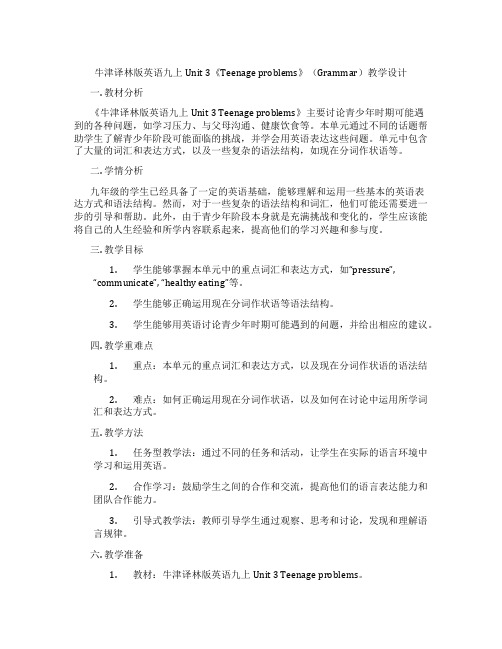
牛津译林版英语九上Unit 3《Teenage problems》(Grammar)教学设计一. 教材分析《牛津译林版英语九上Unit 3 Teenage problems》主要讨论青少年时期可能遇到的各种问题,如学习压力、与父母沟通、健康饮食等。
本单元通过不同的话题帮助学生了解青少年阶段可能面临的挑战,并学会用英语表达这些问题。
单元中包含了大量的词汇和表达方式,以及一些复杂的语法结构,如现在分词作状语等。
二. 学情分析九年级的学生已经具备了一定的英语基础,能够理解和运用一些基本的英语表达方式和语法结构。
然而,对于一些复杂的语法结构和词汇,他们可能还需要进一步的引导和帮助。
此外,由于青少年阶段本身就是充满挑战和变化的,学生应该能将自己的人生经验和所学内容联系起来,提高他们的学习兴趣和参与度。
三. 教学目标1.学生能够掌握本单元中的重点词汇和表达方式,如“pressure”,“communicate”, “healthy eating”等。
2.学生能够正确运用现在分词作状语等语法结构。
3.学生能够用英语讨论青少年时期可能遇到的问题,并给出相应的建议。
四. 教学重难点1.重点:本单元的重点词汇和表达方式,以及现在分词作状语的语法结构。
2.难点:如何正确运用现在分词作状语,以及如何在讨论中运用所学词汇和表达方式。
五. 教学方法1.任务型教学法:通过不同的任务和活动,让学生在实际的语言环境中学习和运用英语。
2.合作学习:鼓励学生之间的合作和交流,提高他们的语言表达能力和团队合作能力。
3.引导式教学法:教师引导学生通过观察、思考和讨论,发现和理解语言规律。
六. 教学准备1.教材:牛津译林版英语九上Unit 3 Teenage problems。
2.多媒体教学设备:用于展示PPT和视频材料。
3.教学素材:与本单元主题相关的图片、视频等。
七. 教学过程1.导入(5分钟)通过提问方式引导学生谈论他们所知道的青少年时期的问题,激发学生的兴趣和参与度。
牛津译林版九年级上册Unit 3《Teenage problems》(Study skills)教学

牛津译林版九年级上册Unit 3《Teenage problems》(Study skills)教学设计一. 教材分析牛津译林版九年级上册Unit 3《Teenage problems》(Study skills)围绕着青少年的学习方法展开,旨在让学生通过阅读、听力、口语和写作等环节,了解并掌握各种学习方法,以及如何有效地解决学习中遇到的问题。
本节课的主要内容包括:不同学生有不同的学习风格和策略,如何选择适合自己的学习方法,以及如何养成良好的学习习惯等。
二. 学情分析九年级的学生已经具备了一定的英语基础,能够进行简单的听、说、读、写操作。
但部分学生在面对较复杂的文章时,可能会存在阅读困难,理解能力有限。
此外,学生对学习方法和策略的认识相对较弱,需要老师在教学中进行引导和启发。
三. 教学目标1.知识目标:让学生掌握与学习方法相关的词汇和表达,如effective,strategy, improve等。
2.能力目标:培养学生通过阅读、听力、口语和写作等多种方式,理解和运用本节课所学内容。
3.情感目标:引导学生认识到学习方法的重要性,激发学生探索适合自己的学习方法,养成良好的学习习惯。
四. 教学重难点1.重点:让学生理解和运用本节课所学词汇和表达。
2.难点:引导学生如何选择适合自己的学习方法,以及如何养成良好的学习习惯。
五. 教学方法1.任务型教学法:通过设定各种任务,让学生在实践中学习和运用英语。
2.合作学习法:鼓励学生分组讨论,培养学生的团队协作能力。
3.情感教学法:关注学生的情感需求,激发学生的学习兴趣。
六. 教学准备1.教材:牛津译林版九年级上册Unit 3《Teenage problems》(Studyskills)2.多媒体设备:电脑、投影仪、音响等3.教学素材:相关学习方法的文章、视频等4.课件:制作与本节课相关的内容,包括词汇、图片、视频等七. 教学过程1.导入(5分钟)利用课件展示一些关于学习方法的名言,如“活到老,学到老”、“适合自己的才是最好的”等,引导学生思考如何选择适合自己的学习方法。
9A Unit3 Teenage problems第3课时教案

Unit3 Teenage problemsVocabulary鲁河中学陈寿红Teaching objective:1.To understand the different meanings of the verb “to be”2.To use the verb “to get” when talking about problemsTeaching procedures:Part A1.Explain that the words in the box at the top of Page 44 are synonyms of the verb“to get” below the pictures, and can be used to replace “get” in each picture.2.Ask students to work in pairs to complete Part A.3.For weaker classes, ask students to read out the answer for each picture. Forstronger classes, after students have read out the answers, ask them to make sentences using the phrases under the pictures.Part B1.Explain to students that they can use their answers from Part A to help then withthe exercise in Part B. for weaker classes, students can work in pairs to complete Part B. For stronger classes, students can work on their own.2.For stronger classes, once students have finished, ask two students to read out thewhole letter. Compliment them on parts of the letter they read particularly well. 3.For weaker classes, ask students if they have the same problems as Amy. Askstudents to raise their hands if they do. For stronger classes, ask students what their advice would be for Amy.Exercise:动词填空1.Eating healthily and _________(do) sports are useful.2.Watching films ________(help) me forget my problems.3. I don’t know when and where ___________ (go) tomorrow?4. It is impossible for you ______(get) to school late.5. 请告诉我何时开班会.Please tell me ____________________________.单项选择:1.You are not good at English ,but you can﹐tA. give it inB. give in itC. give it upD. give up it2. I can﹐t decideA. what to do itB. how shall I do ItC. how to do itD. what shall I do it3. your English teacher you ?A. Do ,strict inB. Does ,strict withC. is , strict withD. is strict in4.You must focus your studies.A. inB. onC. atD. with5.You can﹐t too much time TV.A. take ; toB. pay; forC. spend ;to watch.D. spend ; watching6.He has to stay at home because he has close friends.A. a fewB. fewC. littleD. a little .7. it﹐s cold outside .You﹐d better your coat .A put on B. to put on C. wear D. to wear8.How could you make him crying?A. stopB. to stopC. stoppingD. to wear9.The students wet out of the classroomA. noiseB. to stopC. stoppingD. stopped10.He can﹐t find his lovely dog .How she looks!A. sadB. sadlyC.happyD. happilyHomework:课后笔记:。
9AUnit3Teenageproblems教学的使用教案Reading.docx

Teaching Plan for Reading of Unit 3, 9ABy Song Jun, Nengren Middle School, Haimen City Teaching MaterialReading, Unit 3 Teenage Problems, 9AMain PrinciplesTeams (Interactive learning)Positive InterdependenceIndividual AccountabilityExplicit Training in Interpersonal SkillsReflectionTeaching Aimsnguage Focus1)The students will be able to understand and use the words about problems:support, offer, suggestion, strict, value, achieve, refuse, accept, worth, doubt, allow2)The students will be able to understand the following sentences:I doubt whether it is worth working so hard.Then I got into trouble at home because my parents do not allow me to play outside after6 p.m.nguage SkillsThe students will be able to talk about problems and express feeling. And they will be able to learn how to ask for advice.3.Emotional GoalThe students will be encouraged to talk about their problems and try to deal with them.4.Learning StrategiesThe students will be able to guess and reason the presumption by the information collected from the reading of the letters.5.AffectionThe students will be able to focus their attention on the classroom instruction and activities. Teaching AidsBlackboard, Chalk, Computer, Overhead ProjectorTeaching Procedures & ActivitiesPart I. Task-introduction & Revision. (5′)I will show you a picture of ―Growing pains ‖. Growing up can be difficult. You may have many problems. Don ’tbe afraid of telling your problems to people around you. In this period, let ’s try to find out:some teenagers’problemsyour suggestions on how to deal with their problemsyour own problems and ways to solve themProblems can always make teenagers feel unhappy. We learned some about teenage problems last period. Can you remember some? Look at the pictures and talk about their problems. (show the pictures)1.The TV is always on at Kitty ’s home. The noise almost drives her mad.2.Daniel doesn’thave any close friends to talk to. Sometimes, he feels lonely.3.Amy ’s cousin always makes a lot of noise and disturbs her when she ’s studying.4.Sandy’s parents work all day. They don ’thave time for her.lie doesn ’tget enough sleep. She feels tired in class.6.Simon doesn’t have enough time to do his homework.Part II. Pre-reading. (4’)Task One: To Brainstorm and learn the new words.T: Why doesn’tMillie get enough sleep? ⋯Ss: ⋯T: Yes, perhaps she has too much homework. And Simon also doesn ’thave enough time to do his homework. What about your homework?T:Do you often say yes when your teachers give you the homework?Ss: Yes.T:That means you accept it. Why do you accept the homework?Ss:⋯T: Yeah! Because it is important to do the homework. It is of great value. It is worth doing it.Homework accept value be worth doingT:Now, boys and girls. If your teachers give you too much homework, will you accept it?Ss: No.T:I understand. You don ’twant too much homework. You want to say no to it. That means you want to refuse to do it. But most of the time you will have to complete it in the end. Why?Ss: Because our teachers will be angry if we don ’thand in our homework on time.T:Your teachers are very strict with you. Most of the students hate too much homework because they feel tired. At the same time, they have no spare time for their hobbies.Too much homework want to refuse have to complete no spare time for hobbiesToday most students have too much homework to do and they have no time for their hobbies. This is a problem. How to achieve a balance between homework and hobbies? Here are two letters from two teenagers to a youth worker named Sigmund Friend. After you learn the letters, perhaps you will know how to deal with the problem.Read the new words.Part III. While-reading. (20’)Task One: Listen and fill in the forms. (5’)Name Millie_______________have a lot of Problem homework and haveno time for hobbiesSimon__________________stay out to play football, but his parents do not allow him to play outside after 6 p.m.Task Two: Fast-reading. (4’)Read the letters quickly and underline the following sentences, paying more attention to the stressed words. Then finish the Skill B on Page 46.1.I have a problem, and I do not know how to deal with it.2.I want to refuse to do so much work, but usually I just accept it.3.I understand that it is important to do my homework and hand it in on time.4.I am crazy about football.5.I have plenty of friends, and we always play football together at school or in the park.6. Then I get into trouble at home because my parents do not allow me to play outside after6 p.m.7.Can you please advise me how to achieve a balance between my schoolwork and myhobbies?Keys: g— e— b— d—h— f — c— aTask Three: Detail-reading. Answer the following questions about the Reading.(6’)A. TF-questions about Millie. If it is false, complete the statement.lie often stays up late to complete the exercises, but she doesn't feel tired next day.2.Sometimes Millie refuses to do so much homework.lie understands that it is important to do her homework and hand it in on time.lie thinks it is worth working so hard.Keys: FFTFB. Wh-questions about Simon.1.What’s Simon’s favourite hobby?2.What does Simon often do with his friends?3.Why does Simon think his parents are strict?4.What does Simon think of his hobbies?Keys: 1. Playing football. 2. They always play football together at school or in the park after school. 3. Because they do not allow him to play outside after 6 p.m. 4. He thinks hishobbies can help him relax and make his life more interesting.Task Four: Further questions.(5’)Read the text carefully and try to ask questions about the two letters, write down as manyquestions as you can. Then ask and answer the questions. (Girls ask questions aboutMillie and boys answer them. Boys ask questions about Simon and girls answer them.)Part IV . Post-reading. (15’)Task One: Retelling. (4’)Millie ’s letter.Millie has a problem and she doesn't know how to _______________ it. She has a lot ofhomework but she can ’t________________ it because she understand that it is important to do her homework and _______________ on time. She usually just ______________ it and often stays up late to _____________ the exercises. However, she has no ________________ time for her hobbies. She ____________ whether it is ___________________________. She is _________________ a holiday without homework and she wants Sigmund Friend to _________________.Keys: deal with; refuse (to do); hand it in; accepts; complete; spare/ free; doubts; worth working so hard; looking forward to; offer/give her some suggestions/adviceSimon’s letter.Simon is so _____________ football that he likes _________________to play football withhis friends. His parents are very ______________ with him and they do not _______________ him to play outside after 6 p.m. Simon feels stressed and angry _____________________. He thinks hobbies can help him ______________ and make his life __________________. He wishes he could have his parents’______________. He wants Sigmund Friend to tell him how to ___________________________ between his school work and his hobbies.Keys: crazy about; staying out late; strict; allow; from time to time; relax; more interesting; support; achieve a balanceTask Two: Complete the two letters on Page 47. (4’)Keys:To Millie: offer; choice; complete; hobbies; volleyball; worthTo Simon: advice; playing; stay out; balance; strict; valueTask Three: Discussion. (4’)A.Talk about your own problems in pairs. Write down the problems on your paper.B.Exchange some problems in the whole class with the help of the teacher. Show some ofthe problems before the whole class. Try to give some suggestions on how to solve theproblems.Task Four: Written work: Translate the phrases into English.(3’)1.处理这个问题2.准时上交作业3.拒绝接受家作4.值得努力工作5.提供给我一些建议6.对某人严格7.允许我在外面玩8.建议我少花一些时间在足球上1.deal with the problem2.hand in homework on time3.refuse to accept the homework4.be worth working hard5.offer me some suggestions6.be strict with sb7.allow me to play outside8.advise me to spend less time on footballPart V . Homework.(1 ’)A.Remember the new words and phrases in heart.B.Read and retell the two letters.C.Additional exercises.一、根据中英文提示填写。
牛津译林版9AUnit3《teenageproblems》教学设计(共5课时)

2.短片观看后,引导学生分享自己的感受和认识,为新课学习奠定情感基础。
3.提问:“What kind of teenage problems do you think are the most common?”让学生预测本节课将讨论的青少年问题,激发学生的好奇心。
牛津译林版9AUnit3《teenageproblems》教学设计(共5课时)
一、教学目标
(一)知识与技能
1.学生能够理解并掌握本章节关于青少年问题的核心词汇和短语,如:conflict, communicate, independence, rebellion, stress, depression等,并能熟练运用这些词汇进行讨论和表达。
2.语法讲解:结合课文,讲解一般现在时、一般过去时等时态的用法,并举例说明。
3.词汇学习:通过例句、同义词、反义词等形式,帮助学生深入理解重点词汇和短语。
4.阅读策略:指导学生运用扫读、精读等策略,提高阅读理解能力。
5.课堂讲解:针对课文中的难点和重点,进行详细讲解,确保学生理解到位。
(三)学生小组讨论
4.个性化教学:针对不同学生的学习特点,实施差异化教学,提高教学效果。
5.教学评价:采用多元化的评价方式,如自我评价、同伴评价、教师评价等,全面评估学生的学习过程和成果。
6.家校合作:与家长保持沟通,了解学生在家的表现,共同关注学生的成长,形成教育合力。
四、教学内容与过程
(一)导入新课
在导入新课环节,教师将通过以下方式激发学生的学习兴趣和探究欲望:
4.教师展示与本节课相关的词汇和短语,如:conflict, communicate, independence等,让学生尝试猜测它们的意思,为新课学习做好词汇准备。
牛津译林版九年级英语上册 Unit 3 《Teenage problems.》Lesson 3教学设

牛津译林版九年级英语上册 Unit 3 《Teenage problems.》Lesson 3教学设计一. 教材分析《牛津译林版九年级英语上册 Unit 3 Teenage problems. Lesson 3》主要讲述了青少年面临的一些普遍问题,如学习压力、与父母沟通、早恋等,并通过对话形式展示了如何在面对这些问题时进行积极的沟通和解决。
本课内容贴近学生生活,有利于激发学生的学习兴趣,提高他们的语言运用能力。
二. 学情分析九年级的学生已经具备了一定的英语基础,能够理解和运用一些基本的英语句型和词汇。
但同时,他们在学习过程中仍存在一些问题,如:部分学生对英语学习缺乏兴趣,课堂参与度不高;部分学生英语口语表达能力较弱,不敢开口说英语;部分学生对一些英语语法和词汇掌握不扎实,影响阅读和听力理解。
三. 教学目标1.知识目标:学生能够掌握本课中的关键词汇和句型,理解对话内容,能够运用所学知识进行简单的日常交流。
2.能力目标:通过听力、口语、阅读和写作等实践活动,提高学生的英语运用能力。
3.情感目标:培养学生积极面对生活中问题的态度,学会与父母、朋友有效沟通,促进全面发展。
四. 教学重难点1.重点:关键词汇和句型的掌握,对话内容的理解。
2.难点:情态动词 could 的用法,以及如何在实际情境中运用本课所学知识。
五. 教学方法1.情境教学法:通过设定真实的生活情境,让学生在实际语境中学习和运用英语。
2.交际法:鼓励学生积极参与课堂对话,提高他们的口语表达能力。
3.任务型教学法:通过完成各种任务,培养学生运用英语解决问题的能力。
六. 教学准备1.教学课件:制作课件,包括图片、视频、音频等素材,以便于教学展示。
2.教学道具:准备相关的生活用品,如书包、手机等,用于模拟生活情境。
3.作业布置:提前布置预习任务,让学生预习本课内容,为课堂学习做好准备。
七. 教学过程1.导入(5分钟)利用图片和视频展示青少年面临的一些问题,如学习压力、与父母沟通等,引导学生思考并讨论这些问题。
牛津译林版九年级上册Unit 3《Teenage problems》(Grammar)教学设计

牛津译林版九年级上册Unit 3《Teenage problems》(Grammar)教学设计一. 教材分析《牛津译林版九年级上册Unit 3 Teenage problems》主要讨论了青少年时期可能遇到的各种问题,如家庭、学校、朋友以及自我认知等方面。
通过本节课的学习,学生能够掌握一般现在时态的被动语态,以及如何运用一般现在时态进行问题描述。
教材内容贴近学生生活,有利于激发学生的学习兴趣和积极性。
二. 学情分析九年级的学生已经具备一定的英语基础,能够运用一般现在时态进行简单描述。
但部分学生在语法方面仍存在一定的困难,如对一般现在时态的被动语态掌握不扎实。
此外,学生对青少年时期的问题有一定的了解,但可能缺乏对这些问题深度思考和讨论的机会。
三. 教学目标1.知识目标:–能熟练运用一般现在时态的被动语态进行描述。
–掌握与青少年问题相关的词汇和短语。
2.能力目标:–能用英语描述和讨论青少年时期的问题。
–提高学生的团队合作和沟通能力。
3.情感目标:–培养学生对青少年问题的关注和理解。
–引导学生正确面对和处理青少年时期的问题。
四. 教学重难点•一般现在时态的被动语态。
•与青少年问题相关的词汇和短语。
•一般现在时态的被动语态在实际语境中的运用。
•如何在讨论中正确表达自己的观点和情感。
五. 教学方法1.情境教学法:通过设定情境,让学生在实际语境中运用所学知识。
2.任务型教学法:通过完成各种任务,提高学生的实际运用能力。
3.合作学习法:鼓励学生分组讨论,培养团队合作精神。
六. 教学准备1.教学PPT:包括教材内容、语法点讲解、练习题等。
2.教学素材:与青少年问题相关的图片、视频等。
3.分组名单:便于学生进行合作学习。
七. 教学过程1.导入(5分钟)–利用与青少年问题相关的图片或视频,激发学生的兴趣。
–引导学生用英语自由谈论青少年时期遇到的问题。
2.呈现(10分钟)–介绍一般现在时态的被动语态的用法。
–通过例句和练习,让学生掌握一般现在时态的被动语态。
9A Unit 3 Teenage problems教案-9A UNIT3 Checkout
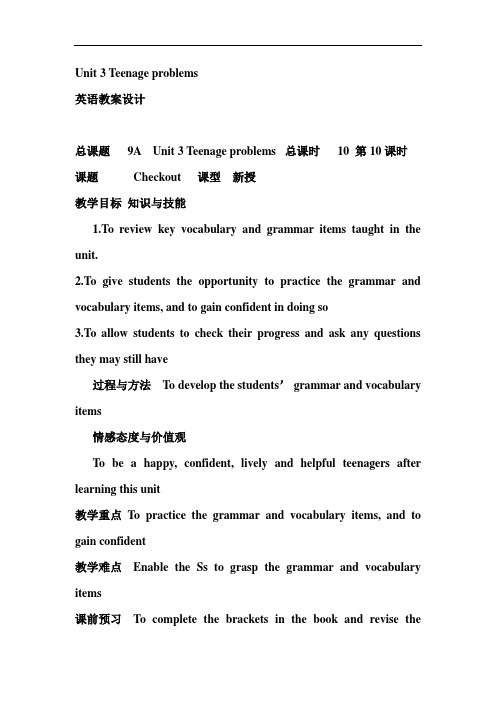
Unit 3 Teenage problems英语教案设计总课题9A Unit 3 Teenage problems 总课时10 第10课时课题Checkout 课型新授教学目标知识与技能1.To review key vocabulary and grammar items taught in the unit.2.To give students the opportunity to practice the grammar and vocabulary items, and to gain confident in doing so3.To allow students to check their progress and ask any questions they may still have过程与方法To develop the students’grammar and vocabulary items情感态度与价值观To be a happy, confident, lively and helpful teenagers after learning this unit教学重点To practice the grammar and vocabulary items, and to gain confident教学难点Enable the Ss to grasp the grammar and vocabulary items课前预习To complete the brackets in the book and revise thegrammar learnedI. Have a revision (2 minutes)II. Revision the grammar learned in this unit by translating some sentences (3 minutes)Ask students to review the sentence types, the object complement and the five basic sentence structures. Encourage students to ask questions if they have any.(2 minutes)III.Part A: Tell students that this is revision. Remind them that they have already learn these words and grammar items so that they do not feel too alarmed. (15 minutes)1.Ask students whether they know any youth workers. E.g., Read the lettersTranslate some sentences into English呈现一些中文句子,通过翻译句子让学生解释归纳和总结本单元的语法,以掌握学生是否真正的懂了What is the name of the youth worker?Is he/she a good youth worker? Why?Give an example of a good piece of advice he/she has given.2.Tell students to complete Part A on their own. When students have finished, check the answers with the whole class. Students correct their own answers and write their marks in the paw.3.Ask students to read out the advice, one student reading one paragraph at a time.4.Ask students whether they think Sigmund Friend gives good or bad advice. Ask them to explain their answers.IV. Part B: Explain to students that in Part B, Amy is thinking these wishes. Ask students why she does not say the words aloud. If students cannot tell you, explain that Western countries, people believe if you say a wish aloud, it will not come true. (8 minutes) Ask students to write the answers to this exercise on their own. Then students check their answers in pairs.V. Sum up and exercises (15 minutes)VI.Homework1.Revise this period.2.Pre-learn the next Unit.VII. Notes after teachingAnswercomplete Part Aread out the adviceask and explainwrite the answerscheck their answers in pairsdo the exercises on the screen.介绍西方文化和背景知识板书设计make somebody do somethingfeel bad about your weightkeep worries to yourselfhave plenty of time for my hobbies keep a balance between……and……。
9A Unit 3 Teenage problems教案-Unit 3 全部教案

Unit 3教案Period 1 Period 1 Comic strip .Vocabulary and ReadingTeaching Aims :1. Know the spelling of some words and usage of some phrases2.Grasp the main idea of Reading and use the information to talk to others aboutone‟s problems and how to deal with them3. Know the different meanings of …get‟Teaching procedures:I.Look at this comic. You know that Eddie is getting fat. Here “get” means “become”. What other meanings does “get” have?选用所给词组的适当形式填空get a good mark, get some help from, get enough sleep, get excited, get a bus, get married1.My uncle ______________ last year.2.Did you hear Simon __________________ in the exam?3.You didn‟t ______________,did you?4.The audience _____________ when they saw Hello Kitty.5.My father _____________ to work every day.6,Shall we ________________ from an adviser?动词作主语, 注意使用动名词形式(-ing),看作单三人称。
牛津译林版9AUnit3《Teenageproblems》教学设计(共9课时)

c.对优秀学生,提供拓展性学习资源,满足他们的学习需求。
3.创设情境,激发学生兴趣:
a.结合学生实际,设计真实、有趣的情境,让学生在情境中学习、运用英语。
b.鼓励学生积极参与课堂活动,提高他们的课堂参与度。
4.评价与反馈:
a.采用多元化的评价方式,关注学生的全面发展。
4.小组合作,准备一个关于青少年问题的角色扮演活动,下节课进行展示。要求每个小组成员参与,运用所学知识进行对话创编。
5.鼓励学生进行课外阅读,选取一篇关于青少年问题的英文文章进行阅读,并完成阅读笔记,记录文章中的生词、短语和有用句型。
6.结合自己的生活实际,思考如何运用所学知识解决青少年时期遇到的问题,并撰写一篇心得体会。
五、作业布置
为了巩固本章节所学知识,确保学生对词汇、语法和语言运用能力的掌握,特布置以下作业:
1.复习本单元的生词和短语,要求学生进行词汇卡片制作,注明单词的音标、词性和中文释义,以便于课后巩固记忆。
2.完成课后练习册中与本单元相关的练习题,重点关注宾语从句、状语从句的运用及不同时态的描述。
3.撰写一篇关于青少年问题的短文,要求运用本节课所学的词汇、语法和句型,字数在100-120词左右。短文内容可涉及以下方面:描述一个青少年问题、分析问题产生的原因、提出解决方案。
牛津译林版9AUnit3《Teenageproblems》教学设计(共9课时)
一、教学目标
(一)知识与技能
在本章节的教学中,学生将通过学习牛津译林版9AUnit3《Teenageproblems》的内容,掌握以下知识与技能:
1.掌握并运用本单元的生词、短语和句型,如:irritate, confident, deal with, adjust to, communicate with等,提高英语语言表达能力。
九年级英语上册9AUnit3《TeenageProblems》Reading教学设计牛津版

九年级英语上册9AUnit3《TeenageProblems》Reading教学设计牛津版9A Unit3《Teenage Problems》Reading教学目标:1、学习如何写出自己的烦恼及如何表达情感2、学习如何向别人寻求建议。
教学重点、难点:deal with stay up late hand in hear from plenty of on time be of great value crazy aboutstay out late allow sb. to do it from time to timeachieve a balanceI have no choice but to do it.I hardly have any space time for my hobbies such as playing volleyball and ping-pong.I often doubt whether it is worth working so hard.Can you offer me some suggestions?My dream is to be a great football player.I believe it is important for us to spend some time on our hobbies/Can you please advise me how to achieve a balance between my schoolwork and my hobbies?教学准备:A computer A radio教学步骤:Step 3 Activities;1、完成以下表格,谈论Million 和 Simon的苦恼。
Step 4 Presentation:1、解释课文中的重点及难点⑴be crazy about⑵My dream is to be\do sth⑶plenty of⑷stay out late( to do sth)⑸get into trouble⑹allow sb to do sth⑺be strict with sb\about sth⑻have one’s support⑼advise sb to do sth⑽achieve a balance between and2、完成46页B部分练习3、连接下列同义词或反义词go home adviceearlier latersuggest rememberforget about stay out4、完成47页D部分练习Step 5 家庭作业1、记忆相关词汇、词组及句型。
9A unit3 Teenage problems教案
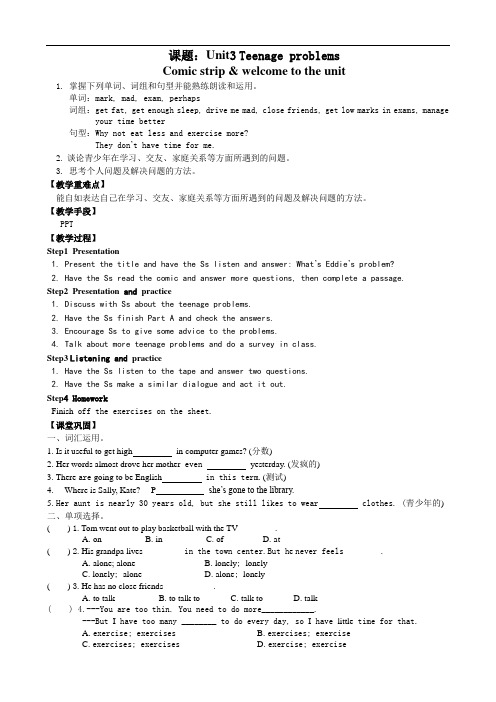
课题:Unit3Teenage problemsComic strip & welcome to the unit1. 掌握下列单词、词组和句型并能熟练朗读和运用。
单词:mark, mad, exam, perhaps词组:get fat, get enough sleep, drive me mad, close friends, get low marks in exams, manage your time better句型:Why not eat less and exercise more?They don’t have time for me.2. 谈论青少年在学习、交友、家庭关系等方面所遇到的问题。
3. 思考个人问题及解决问题的方法。
【教学重难点】能自如表达自己在学习、交友、家庭关系等方面所遇到的问题及解决问题的方法。
【教学手段】PPT【教学过程】Step1Presentation1. Present the title and have the Ss listen and answer: What’s Eddie’s problem?2. Have the Ss read the comic and answer more questions, then complete a passage.Step2Presentation and practice1. Discuss with Ss about the teenage problems.2. Have the Ss finish Part A and check the answers.3. Encourage Ss to give some advice to the problems.4. Talk about more teenage problems and do a survey in class.Step3 Listening and practice1. Have the Ss listen to the tape and answer two questions.2. Have the Ss make a similar dialogue and act it out.Step4 HomeworkFinish off the exercises on the sheet.【课堂巩固】一、词汇运用。
【知识学习】9A Unit 3 Teenage problems教案
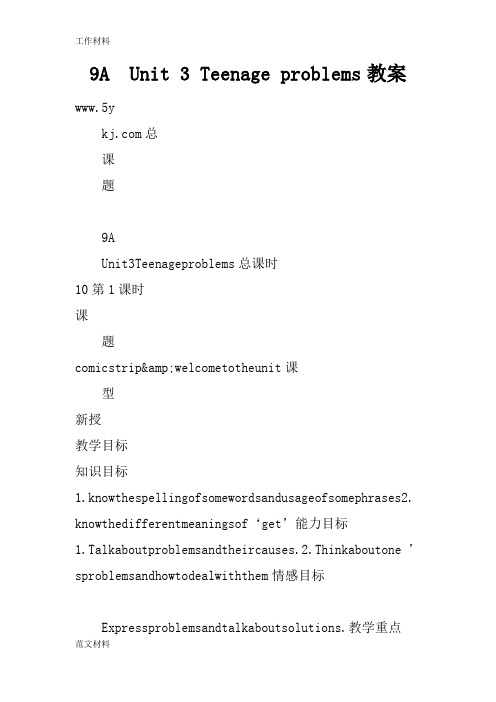
9A Unit 3 Teenage problems教案www.5y总课题9AUnit3Teenageproblems总课时10第1课时课题comicstrip&welcometotheunit课型新授教学目标知识目标1.knowthespellingofsomewordsandusageofsomephrases2. knowthedifferentmeaningsof‘get’能力目标1.Talkaboutproblemsandtheircauses.2.Thinkaboutone’sproblemsandhowtodealwiththem情感目标Expressproblemsandtalkaboutsolutions.教学重点Talkaboutproblemsandtheircauses.教学难点Expressproblemsandtalkaboutsolutions.课前预习1.Previewthenewwordsandphrases2.Pre-learnPeriod1:co micstrip&welcometotheunit教学过程教师活动学生活动备课札记Step1warm-up1.Explainthatmostteenagershaveproblems. Tellthemthatiftheyeverneedtotalkabouttheirproblems, theyshouldtalktotheirteachers,friendsorfamily.Tellt hemthathavingaproblemisnothingtobeashamedof-----eve ryonehasworriesfromtimetotime.2.Doasurveyoftheproblemsthatthestudentsintheclasshave.3.Discusstheproblemsquestionedbythestuden icstrip1.Askthestudentstolistentothetap ewiththebooksclosed.Andthenansweraquestion “whatproblemhasEddiegot?”.2.TellthemthatEddieisge ttingfat.Here“get”means “become”.whatothermeaningsdoes“get”have?Listenandthinkwhatproblemstheyhave.workinpairs DiscusssomeproblemsListenandprepareforthequestionTh inkabouttheusagesof“get”从学生身边的话题谈起,引发学生思考并讨论。
牛津英语9A《Unit 3 Teenage problems》教学设计
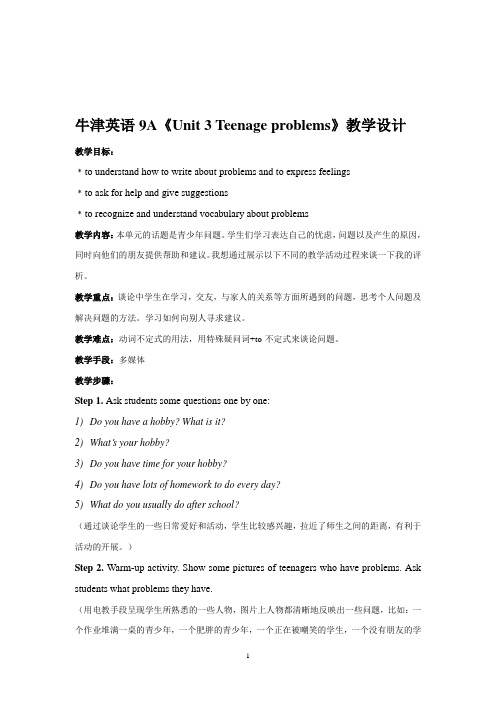
牛津英语9A《Unit 3 Teenage problems》教学设计教学目标:﹡to understand how to write about problems and to express feelings﹡to ask for help and give suggestions﹡to recognize and understand vocabulary about problems教学内容:本单元的话题是青少年问题。
学生们学习表达自己的忧虑,问题以及产生的原因,同时向他们的朋友提供帮助和建议。
我想通过展示以下不同的教学活动过程来谈一下我的评析。
教学重点:谈论中学生在学习,交友,与家人的关系等方面所遇到的问题,思考个人问题及解决问题的方法。
学习如何向别人寻求建议。
教学难点:动词不定式的用法,用特殊疑问词+to-不定式来谈论问题。
教学手段:多媒体教学步骤:Step 1. Ask students some questions one by one:1)Do you have a hobby? What is it?2)What’s your hobby?3)Do you have time for your hobby?4)Do you have lots of homework to do every day?5)What do you usually do after school?(通过谈论学生的一些日常爱好和活动,学生比较感兴趣,拉近了师生之间的距离,有利于活动的开展。
)Step 2. Warm-up activity. Show some pictures of teenagers who have problems. Ask students what problems they have.(用电教手段呈现学生所熟悉的一些人物,图片上人物都清晰地反映出一些问题,比如:一个作业堆满一桌的青少年,一个肥胖的青少年,一个正在被嘲笑的学生,一个没有朋友的学生。
9A Unit 3 Teenage problems 教案
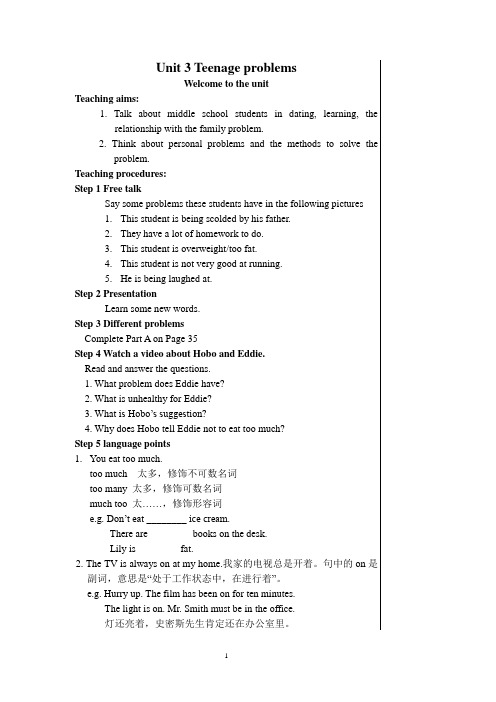
Unit 3 Teenage problemsWelcome to the unitTeaching aims:1. Talk about middle school students in dating, learning, therelationship with the family problem.2. Think about personal problems and the methods to solve theproblem.Teaching procedures:Step 1 Free talkSay some problems these students have in the following pictures1.This student is being scolded by his father.2.They have a lot of homework to do.3.This student is overweight/too fat.4.This student is not very good at running.5.He is being laughed at.Step 2 PresentationLearn some new words.Step 3 Different problemsComplete Part A on Page 35Step 4 Watch a video about Hobo and Eddie.Read and answer the questions.1. What problem does Eddie have?2. What is unhealthy for Eddie?3. Wha t is Hobo’s suggestion?4. Why does Hobo tell Eddie not to eat too much?Step 5 language points1.You eat too much.too much 太多,修饰不可数名词too many 太多,修饰可数名词much too 太……,修饰形容词e.g. Don’t eat ________ ice cream.There are ________ books on the desk.Lily is ________ fat.2. The TV is always on at my home.我家的电视总是开着。
9A Unit 3 Teenage problems教案A Unit3 main task
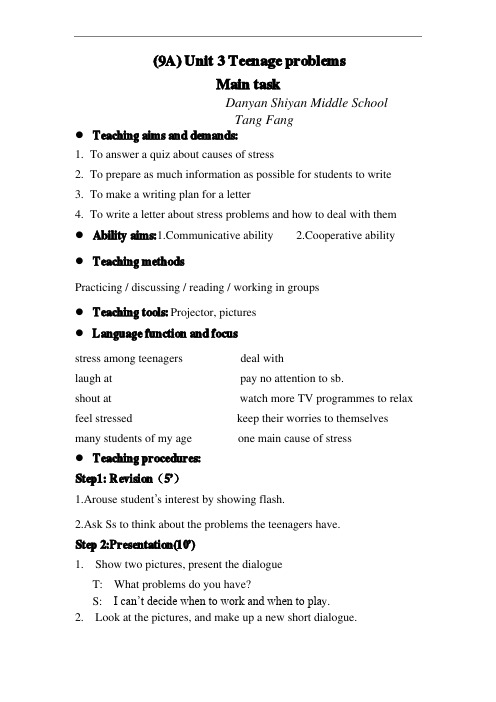
(9A) Unit 3 Teenage problemsMain taskDanyan Shiyan Middle SchoolTang Fang●Teaching aims and demands:1.To answer a quiz about causes of stress2.To prepare as much information as possible for students to write3.To make a writing plan for a letter4.To write a letter about stress problems and how to deal with them●Ability aims:municative ability 2.Cooperative ability●Teaching methodsPracticing / discussing / reading / working in groups●Teaching tools: Projector, pictures●Language function and focusstress among teenagers deal withlaugh at pay no attention to sb.shout at watch more TV programmes to relax feel stressed keep their worries to themselves many students of my age one main cause of stress●Teaching procedures:Step1: Revision(5’)1.Arouse student’s interest by showing flash.2.Ask Ss to think about the problems the teenagers have.Step 2:Presentation(10’)1.Show two pictures, present the dialogueT:What problems do you have?S:I can’t decide when to work and when to pla y.2.Look at the pictures, and make up a new short dialogue.T:What problems do you have?S1:I don't get enough sleep. I feel tired in class.S2:I don't have enough time to do my homework.S3:The TV is always on at home. The noise almost drives me mad.S4:I don't have close friends to talk to. Sometimes, I feel lonely.S5:My cousin always makes a lot of noise and disturbs me when I’m studying.S6:My parents work all day. They don't have time for me.……3.Sum up:Growing up can be difficult.What problems may the students have ?4.Read Millie’s letter,discuss to find out Millie’s problems and give her some useful advice.Step3: Part A (10)1.Explain the context.Mr.Wu has set a quiz for the Class1,Grade9 students about good and bad ways to deal with problems.2. Tell students that they will take part in the quiz in Part A on page 57. Read out one question at a time,as well as all the answer choices. Students should work on their own and keep their answers secret.Tell students they are not allowed to discuss their answers with their classmates.3. Competition. (boys and girls)Take turns to read out the best answer to each of the questions.Each student must mark the book he/she has been given. Talk about why one way of dealing with problems might be better than another. Ask students if they have other ideas about how to deal with stressful situations.Step 4: Part B(10)Tell students that it is a good idea to make a writing plan for any piece of writing, whether it is a letter, an essay or a report. This is important not just for English, but for other subjects as well. Remind students that theycan use the information to help them complete the writing plan in Part B. They can also use ideas that were generated in the extension activity on page 57.Step 5 :Part C(5’)1.Ask a student to read Millie’s letter in Part C aloud.Ask studentswhether they have any questions about meaning or vocabulary.2.Students have only to fill in two blanks based on the information inMillie’s notes. Tell students to complete Part C on their own.3. Get them to write a letter like the model letter.Step 6:Open reading. (5’)Reading comprehensionStep7: HomeworkWrite a letter about your own problems and how you deal with them.●Blackboard design(9A) Unit 3 Teenage problemsMain taskugh at8.the problem of stress2.shout at9.many students of my age3.give up10.have enough time to do sth.4.feel stressed11.how to deal with the problem5.stress among teenagers12.keep their worries to themselves6.pay no attention to sb.13. watch more TV programmes to relax7.one main cause of stress14. share my problems with my friends●教学后记:利用Flash调动学生的兴趣,让学生开口说。
- 1、下载文档前请自行甄别文档内容的完整性,平台不提供额外的编辑、内容补充、找答案等附加服务。
- 2、"仅部分预览"的文档,不可在线预览部分如存在完整性等问题,可反馈申请退款(可完整预览的文档不适用该条件!)。
- 3、如文档侵犯您的权益,请联系客服反馈,我们会尽快为您处理(人工客服工作时间:9:00-18:30)。
九年级复习教学案9A Unit 3 Teenage problems (3)一、教学重点To express teenage problems and talk about how to deal with them.Words and expressions & Grammar.二、教学难点To express teenage problems and talk about how to deal with them.Words and expressions & Grammar.三、教学流程Unit 3同步调查测试一、根据句意和提示,在空白处填入适当的单词。
1. My teacher was angry with me yesterday because I didn’t ______ (完成) theexercises.2. All __________ (证明) his advice quite right .3. He paid no __________(注意) to the teacher.4. Don’t ___________ (责备) him please , he is in deep sorrow now .5. The heavy rain was the ___________ (原因) of the flood .6.It’s very nice of you to offer me so many good _______(建议).7.Her parents are very ______ (严格) with her.8.He is an_____(patient)doctor. He always shouts at his______(patient).9.Everyone can’t a_______(reach by effort) success without hard work.10.Jim speaks in such a low voice that we h________ hear him.二、完成句子:1. Her job is _____________________________ (照顾好孩子们).2. She’s often heard to read English in the morning,_______?(反意问句)3.What a hard-working boy Simon is!(同义句) ____________________.4. Does Jack know who he can talk to for help? (同义句).5. It’s important for us ___________ (learning, to learn) English well.6.Did Millie do well in Science last term?(同义句)_________________?7.Her classmates all call her a bookworm. (对划线部分提问)_____ _____ her classmates all______ her?8.Her favourite subjects are English and Maths. (同义句)She _____________________________________________.9 It is a very busy day. (感叹句)______a _____ _____ it is!10.You dislike this kind of books,____________________ (反意疑问句)11.You must be polite to the elderly. (祈使句)______________________12.有几种简单的解决压力的办法。
There are some _______ _______ _______ ______ _______stress.根据情景提示和要求,用英语写出相应的句子(13-15题)13..You want to ask your friend to go shopping with you, what will you say to her?_____________________________________________________________14. It’s very cold today. What will you say if you want to close the door?_________________________________________________________15.你想知道你的朋友对最近电视上播放的“Happy Boys”的看法,用英语怎么表达?三、用方框中所给单词或短语的正确形式填空。
2. Believe in yourself and ________________ your school work.3. My sister is good at writing and she enjoys ___________________ in her free time.4. All my classmates are busy ____________________ at the end of the term.5. Our teachers always tell us not to _______________ when we meet with some difficulties.6. My friends and I like _______________ to play football after school.7. Our Chinese teacher is very __________________ us in our homework.8. Many students of my age ___________________ stress at the moment.9. Don’t forget to _________________ your projects by the end of next week.10. Plan your day carefully and _______________ all the things you have to do.单项选择四、选择题( ) 1. I have never seen ________interesting film before.A. suchB. such anC. so anD. an such ( ) 2..Do you often go to the library?I _______it, but I have no time now.A. use to doB. used to doingC. am used to do D .used to do ( ) 3. Did the worker notice ________in the lake?A. something strange B anything strange C .strange anything D strangesomething( ) 4.______it’s still early, _________I’m going to sleep.A .Though /but B. But / though C. Though, / D. But, / ( ) 5. What does the word “dream” mean?I ________ know. You may in the dictionaryA. doesn’t , look up itB. don’t , look for itC. /, look it upD. don’t ,look it up( ) 6. Tom ________ out to have a rest after he ________ his homework .A. went , finishB. went , finishedC. went , had finishedD. B andC .( ) 7. The number of the students in our school ________ about 40. A number of them ______from the city .A. are , comeB. is , comesC. is , areD. are ,comes( ) 8. He liked collecting stamps ________ he was a child .A. beforeB. afterC. whileD. as soon as ( ) 9. This book makes him___________.A. to be happyB. happyC. to feel happyD. happily( )10 . What happened to you just now ? A bike suddenly hit me while I was walking _____ the road.A. throughB. crossC. acrossD. with( )11.─Where ____ you ______? ─I went to the science hall just now .A. have goneB. did / goC. have beenD. has been to ( )12. One of my ______ is ________ at the famous music school .A. dream / studyingB. dreams / studyingC. dreams / to studyD. dream / studies( )13. ─What would you like , tea or coffee ?─_________ . I’d like some water.A. BothB. EitherC. NeitherD. None( )14.─Could you give me a pen ___________?I can’t find one.—Here you are .A. to write withB. to writeC. to write onD. writing with ( )15. Did you _______ six days a week ?A. used to workB. use to work C .used to working D. use to working ( ) 16. If you don’t want to go swimming, I won’t, .A. tooB. alsoC. eitherD. neither ( )17. —What’s up?—I can’t stand the noise outside. It’s nearly me mad.A. driveB. drivingC. leaveD. coming ( ) 18. “This made me feel angry.” Is a kind of _________ structure.(结构)A. S + V + OB. S + V + DOC. S + V + IO + DOD. S + V + DO + OC( ) 19. _________ may not seem very _________.A. Watch TV; usefulB. Watch TV; usefullyC. Watching TV; usefullyD. Watching TV; useful( ) 20. We must be strict _________ ourselves and strict _________ our work.A. in; withB. with; inC. in; inD. with;with( ) 21. Don’t open the window, _________?A. shall weB. won’t youC. do youD. will you ( ) 22. The workers were made __________ the whole day.A. workB. to workC. workedD. working ( ) 23. The students went out of the classroom __________.A. noiseB. noisyC. noisilyD. quiet ( ) 24. If you don’t go to the cinema tonight, __________.A. so will IB. Neither do IC. Nor shall ID. So I will ( ) 25 __________ of the twins has been there before.A. BothB. NeitherC. allD. None( )4. What does 2045 mean? It means____________.A.twenty forty-five in the evening.B.eight forty-five in the morningC.a quarter past eight in the eveningD.a quarter to nine in the evening ( )5.What is the flight number from Beijing to Abu Dhabi?A .F002,F004 and F012.B .F002, F008 and F012.C.F002,Foo8, and F018D. F012, F016 and F022( )6.How long does it take to fly from Beijing to Doha?A. Nine and a half hours.B. Nineteen hours and a half.C. Seven hours and a half.D. Six hours and a quarter.( )7.When is it possible for one to fly from Beijing to Abu Dhabi and then to Bahrain on the same day?A.Monday and Wednesday.B. Monday.C. Wednesday.D. It’s not possible.教学反思。
